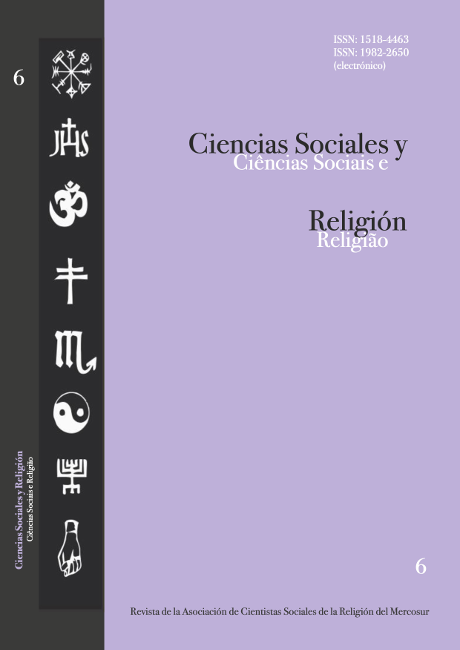Abstract
This article analyzes the ways in which five religious groups — CatholicBase Communities and Charismatics; Mainline Protestants; Pentecostals andneo-Pentecostals — in a slum in Duque de Caxias (Baixada Fluminense in theperiphery of Rio de Janeiro) view drug trafficking, the police, and local politicalpower. Taking the establishment of a model of political domination based onclientelism and violence as the socio-political backdrop, the article examines howthe State becomes entwined with drug trafficking and how it benefits from theviolence generated by this trafficking. The article also explores responses to thisdynamics in the religious field, highlighting links between various religiousideologies and practices and the local structure of domination, particularly asembodied in clientelism and its electoral expression.
References
ALVES, José Cláudio Souza (1998). Baixada Fluminense: a violência na construção do poder. Tese de doutorado em sociologia, USP/FFLCH, São Paulo.
ALVES, José Cláudio Souza. (1991). Igreja Católica, opção pelos pobres, política e poder: o caso da paróquia do Pilar. Dissertação de Mestrado em Sociologia e Política, PUC/RJ, Rio de Janeiro.
ALVES, José Cláudio Souza. (2002). Violência e religião na Baixada Fluminense: uma proposta teórico metodológica. Revista Rio de Janeiro. Rio de Janeiro: Fórum Rio de Janeiro, Nape/ Departamento de Extensão/SR-3/UERJ, n8, p. 59-80.
BOURDIEU, Pierre (1987). A economia das trocas simbólicas. 2 ed. São Paulo: Editora Perspectiva, 2. ed.
BURDICK, John (1993). Looking for God in Brazil: the progressive catholic church in urban Brazil’s religious arena. Berkeley, Los Angeles, London: University of California Press.
CESAR, Waldo & SHAULL, Richard (1999). Pentecostalismo e futuro das igrejas cristãs: promessas e desafios. Petrópolis: Vozes.
GRAMSCI, Antonio (2000). Maquiavel: notas sobre o Estado e a política. In: GRAMSCI, Antonio. Cadernos do Cárcere. Rio de Janeiro: Civilização Brasileira, vol. 3.
MARIZ, Cecília L (1988). Religião e Pobreza: uma comparação entre CEBs e Igrejas Pentecostais. Comunicações do ISER, ano 7, n30, p.10-19.
MARIZ, Cecília L . (2001) Católicos da libertação, católicos renovados e neopentecostais. Cadernos CERIS, Rio de Janeiro, n2. p. 17-42.
MOREIRA, Marcelo (1998) “Uma solução a cada quinze mortes”. Jornal do Brasil. Rio de Janeiro. 24 de maio, p. 29.
MOREIRA, Tânia Maria Salles (1999) Chacinas e Falcatruas. Rio de Janeiro: Ed. Lumen Júris.
PETERSON, Anna (1994) Cultural criticism and the left in Latin America. Socialist Review. Durham. Vol. 24. n3. Duke University Press. p. 130-144.
PORTELLI, Hugues (1977) Gramsci e o bloco histórico. Rio de Janeiro: Paz e Terra.
STEIL, Carlos Alberto (1998) A Igreja dos Pobres: da secularização à mística. Religião & Sociedade, Rio de Janeiro, vol. 19, n2, p. 61-76.
TORRES, Rogério e MENEZES, Newton (1987). Sonegação Fome Saque. Duque de Caxias: Consórcio de Administração de Edições.
VÁSQUEZ, Manuel A. (1997) Structural Obstacles to Grassroots Pastoral Practice: The Case of a Base Community in Urban Brazil. Sociology of Religion, vol. 58, n. 1, p. 53-68.
VÁSQUEZ, Manuel A. (1998) The Brazilian popular church and the crisis of modernity. New York: Cambridge University Press.

This work is licensed under a Creative Commons Attribution-NonCommercial-ShareAlike 4.0 International License.
Copyright (c) 2020 José Claudio Souza Alves
